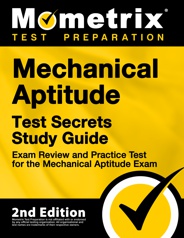Assessment tests used to evaluate mechanical understanding and knowledge are referred to as mechanical aptitude tests. The purpose of these tests is to determine a person’s capability to learn mechanical skills by assessing their competency in problem-solving, applying physical laws, and understanding mechanical operations.
Check out Mometrix's Mechanical Aptitude Study Guide
Get practice questions, video tutorials, and detailed study lessons
Get Your Study Guide
FAQs
Q
Who should take the exam?
A
Mechanical aptitude tests are frequently used in the application and selection process for a large variety of jobs including auto mechanics, aircraft technicians, machine operators, firefighter school, the military, and more.
Q
What is the cost of the test?
A
There is typically no cost to the applicant as the exam fee is paid for by the company, school, or organization requiring the test.
Q
When and where do I take the test?
A
The time and location of the test is determined by the administrator of the test.
Q
Am I allowed to use any reference materials or a calculator while taking the exam?
A
Candidates are not allowed to use any reference materials or calculators.
Q
What is the content of Mechanical Aptitude tests?
A
Questions on mechanical aptitude tests fall into one of four categories:
- Mechanical Comprehension
- Mechanical Knowledge
- Electronics Knowledge
- Mechanical Tools
The vast majority of the questions fall into the category of Mechanical Comprehension (also referred to as mechanical reasoning). Depending on the purpose of the test, it is possible that all the questions fall into this content area; however, the exam often includes questions specific to the job for which the candidate is applying.
Q
What content is included in the Mechanical Comprehension test questions?
A
These questions will evaluate you understanding of basic physical principles and mechanical concepts. Some topics included are: levers, springs, pulleys, gears, balancing scales, hydraulics, gravity, acceleration, weights, magnetism, pressure, friction, and energy types.
Q
Where are Mechanical Comprehension tests used?
A
These tests are most commonly used as a pre-employment assessment for occupations such as mechanics, millwrights, mechanics, electricians, line assembly workers, and more.
Q
What content is included in the Mechanical Knowledge test questions?
A
These questions evaluate the candidate’s knowledge of basic physics and mechanics, most often auto mechanics. Topics may include auto mechanics (batteries, engines, brakes, hydraulics, engine oil, etc.), energy types, acceleration and momentum, mechanical advantage, effort, friction, gravity, and compression.
Q
Where are Mechanical Knowledge tests used?
A
The most common use of this test is as a school admission test, primarily for auto mechanic schools.
Q
What content is included in the Electronics Knowledge test questions?
A
Questions in this content area evaluate the candidate’s knowledge of basic electronic circuits and electronic theory. Topics may include batteries, basic electronic components, series and parallel circuits, voltage, current, resistance, Ohm’s law, and equipment used when working with electronics.
Q
Where are Electronics Knowledge tests used?
A
The most common use of this test is as a school admission test for an electrician school or by companies hiring for positions where this type of knowledge is important. The test is also included as part of the Armed Services Vocational Aptitude Battery (ASVAB).
Q
What content is included in the Mechanical Tools Test questions?
A
Questions in this content area involve a wide array of tools from common hand tools to powered industry tools. Questions may ask the candidate to identify specific tools, the purpose of the tool, or in which trade the tool is often used. These questions are most commonly used in trade school admission tests.
Q
How are the tests scored?
A
Scores are reported in two ways. A raw score is given indicating the total number of questions answered correctly. A percentile rank score is also provided which indicates how the individual’s score compared to others who took the test. For example, an individual could receive a raw score of 35 questions answered correctly out of the 40 total questions. That individual could receive a percentile score of 90 indicating that they scored higher than 90% of the people who took this test.
Q
How can I best prepare for this exam in the least amount of time?
A
The test experts at Mometrix have diligently researched the mechanical aptitude tests to identify the specific topics and concepts you must know to score well. All the information you need to be successful on these tests and to begin your new career can be found in the Mechanical Aptitude Test Secrets Study Guide. This study guide from Mometrix will not only provide a review of all the material you need to know but, most importantly, how to apply this knowledge accurately. When you order this study guide, you will also receive practice test questions, test taking strategies, study skill techniques to save you time and frustration, tips for dealing with test anxiety, and a 100% money back guarantee. You have nothing to lose and everything to gain by ordering the Mechanical Aptitude Test Secrets Study Guide today!
